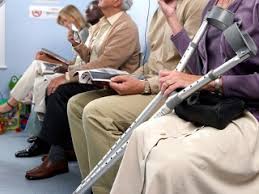February 11th, 2011 by EvanFalchukJD in Health Policy, Opinion
No Comments »

Dick Quinn of Quinn’s Commentary has a pithy post about why it’s hard for the government to control healthcare costs. He says:
Nobody complains about the cost of healthcare, rather they complain about their insurance premiums or their payroll deductions for health benefits.
He’s right about what politicians react to. The healthcare reform law is loaded with things that are meant to contain the price of coverage. But I would add two words to his post:
“Nobody who votes complains about the cost of healthcare.”
It’s true: The large employers who pay for much of healthcare in America complain about the cost a lot. But they are doing something about it.
In my work, I have the opportunity to present at events with some of our Fortune 500 clients. (I have one this week with The Home Depot, hosted by the National Business Group on Health. The event information here — you have to be a member of the NBGH to participate). Listening to these customers, you get a good sense of how employers are attacking this problem.
Here are the top three trends I see benefits professionals talking about:
1. Engagement and Prevention
Doing things to help employees be enthusiastic believers in their company is high on the list of many companies’ strategic objectives. Employee benefits are an important part of that.
A senior benefits leader at a Fortune 100 employer I presented with earlier this year said his company surveyed its employees to see what they wanted in their benefits package. Number 1? That the company’s benefits show it really cares about their well-being. Benefits professionals see health benefits as an opportunity to engage employees in their jobs. Read more »
*This blog post was originally published at See First Blog*
February 9th, 2011 by KevinMD in Health Policy, Opinion
No Comments »

Health reformers propose the proliferation of integrated health systems, like the Mayo Clinic or Kaiser Permanente, which, according to the Dartmouth Atlas, lead to better patient care and improved cost control.
To that end, accountable care organizations (ACOs) have been a major part of health reform, changing the way healthcare is delivered. Never mind that patients may not be receptive to the new model, but the creation of these large, integrated physician-hospital entities that progressive policy experts espouse comes with repercussions. Monopoly power.
To prepare for the new model of healthcare delivery, physician practices have been consolidating. In many cases, they’re being bought by hospitals. Last year, I wrote how this is leading to the death of the private practice physician.
But with consolidation comes a tilt in market power. Health insurers, desperate to control costs, are finding it more difficult to negotiate with hospital-physician practices that dominate a market. And patients are going to side with the hospital — insurers that leave out popular doctors and medical facilities face a backlash from patients. Witness the power that Partners Healthcare has in the Boston market that’s mostly driven by patient demand for big-reputation, high-cost Massachusetts General Hospital and Brigham and Women’s Hospital. Read more »
*This blog post was originally published at KevinMD.com*
February 5th, 2011 by Veronica Sikka, M.D., Ph.D. in Health Policy, Opinion
No Comments »
 In 1986, when Congress passed the Emergency Medical Treatment and Active Labor Act (EMTALA), hospitals and ambulance services were mandated by law to stabilize anyone needing emergency healthcare services regardless of citizenship, legal status, and/or insurance status.
In 1986, when Congress passed the Emergency Medical Treatment and Active Labor Act (EMTALA), hospitals and ambulance services were mandated by law to stabilize anyone needing emergency healthcare services regardless of citizenship, legal status, and/or insurance status.
This was instituted at the time to prevent the prevalent practice of “dumping” — refusing to treat patients because of insufficient insurance or transferring or discharging patients on the basis of anticipating high diagnosis and treatment costs. While the implications of this law are indeed very noble in providing undifferentiated care to all patients based solely on healthcare needs and not financial status, it has unfortunately led to many patients presenting to the emergency department (ED) for primary care issues.
The misconception is that the care in the ED is similar if not better (because of increased access to consult services and imaging) and quicker than waiting to see your primary care physician (PCP). A 2010 study published in Health Affairs found that 14 percent to 27 percent of visits to hospital EDs are nonemergent, such as minor infections, strains, fractures, and lacerations. The study found that all of these cases could have been appropriately triaged in urgent care centers or retails clinics.
England has a model that may be a potential solution. The healthcare goal of the National Health Services (NHS) is to “treat the right patients in the right place at the right time.” The NHS employs nurses and paramedics to handle 999 (their equivalent of our 911) triage calls with more appropriate triaging of patients based on acuity. Read more »
February 2nd, 2011 by Edwin Leap, M.D. in Better Health Network, Opinion
No Comments »

My partners and I have long struggled with the lack of specialty back-up at our hospital. Semi-rural hospitals, out of the way facilities, just can’t always attract specialists. So, we’re happy to have cardiologists every night, but understand that we only have an ENT every third night. We’re thankful to have neurologists, even if they don’t admit anyone. We’re glad to have radiologists, even if they don’t read plain films after 5PM on weekdays.
Still, I continue to scratch my head about why only three of seven community pediatricians take call, such that family physicians have to admit their patients. I was bumfuzzled that our neurologists were previously going to require us to use telemedicine for stroke evaluation when their offices were close by the hospital. (In the same year they were called in roughly three times per neurologist for urgent stroke evaluation.) That problem was resolved, thank goodness.
Now, I find that the problem has returned and grown. We will, very soon, have no ophthalmologist on call, despite the fact that we have three in the community and that they are contacted with remarkable rarity to deal with on-call emergencies. Soon, we will have no neurologist on the weekend. And the pediatric problem remains.
Of course, I’m using my local experience to highlight something that isn’t a local problem at all. It’s a national problem. All over America, specialists are relinquishing their hospital priveleges and staying in the office. Proceduralists are opening surgery centers that are free from the burdens of indigent care. Primary care physicians are allowing hospitalists to do all of their admissions.
In the process, not only are patients losing out, but referral centers are being absolutely overwhelmed. The cities and counties that lie around teaching hospitals are sending steady streams of patients, since they have fewer and fewer specialists. Those referral and teaching centers want patients, but they can’t take all of the non-paying patients, all of the complicated, or even all of the mundane patients with no local coverage. Those facilities, for all their shiny billboards and “center of excellence” marketing, will collapse. Read more »
*This blog post was originally published at edwinleap.com*
February 1st, 2011 by DrWes in Better Health Network, Opinion
No Comments »

 It came as a Twitter “follow” from @coldfeet65, a self-proclaimed “Nurse Practitioner Hospitalist.” I had never heard this term before. Does it mean a nurse practitioner who cares for hospitalists? Or is it a hospitalist who is a nurse practitioner? Or maybe it’s a nurse practitioner who helps hospitalists? (Honestly, I think I know which one she means, but you get my point.)
It came as a Twitter “follow” from @coldfeet65, a self-proclaimed “Nurse Practitioner Hospitalist.” I had never heard this term before. Does it mean a nurse practitioner who cares for hospitalists? Or is it a hospitalist who is a nurse practitioner? Or maybe it’s a nurse practitioner who helps hospitalists? (Honestly, I think I know which one she means, but you get my point.)
Perhaps this is a prescient glimpse to healthcare of the future, where our more typical nurse and doctor labels are supplanted by more and more monikers that serve to confuse, rather than clarify, each of our roles in healthcare delivery. As specialists in cardiology, we’ve seen a similar trend with cardiology hospitalists. But we should be clear what this means to the patients and doctors going forward.
No doubt most people in America still expect to see a doctor when they come to the hospital. Increasingly, it appears that might not be the case. Your doctor might be a robot while a nurse (aka, nurse practitioner) will be the one providing the hands-on care in the inpatient setting. Is that a good thing? Honestly, I’m not sure.
No one argues that the costs in healthcare need to be cut. No doubt the central authority has deemed that doctor salaries will be a big part of that effort. Already, 20 states have cut physician Medicaid payments for fiscal year 2010 and, given the current economic pressure on our states both now and after they start feeling the financial impact of the “Affordable” Care Act in 2019, this trend is not likely to improve anytime soon. As a result, we are seeing that the world is full of “creative solutions” to our healthcare access crisis and the evolution to “nurse practitioner hospitalists” might be one of these. Read more »
*This blog post was originally published at Dr. Wes*
















